Evidence-Based Practice Report: Cognitive Impairment and Nursing
VerifiedAdded on 2022/12/14
|25
|4651
|372
Report
AI Summary
This report delves into the clinical issue of cognitive impairment, focusing on evidence-based nursing practices. It begins with an introduction and an outline of the clinical issue, emphasizing the neurological problems associated with memory and thinking. The report highlights the causes, background, and rationale for addressing cognitive impairment, including its prevalence and impact on older adults. A PICO question is formulated to guide the evidence-based approach, focusing on interventions like cognitive stimulation, reminiscence therapy, and cognitive rehabilitation. The report details an evidence search conducted using Google Scholar, followed by a synthesis of the best evidence from selected articles. An evidence table is provided to summarize the key findings of the studies. The report concludes with recommendations for practice change based on the evidence reviewed, aiming to improve the quality of life for patients suffering from cognitive impairment.
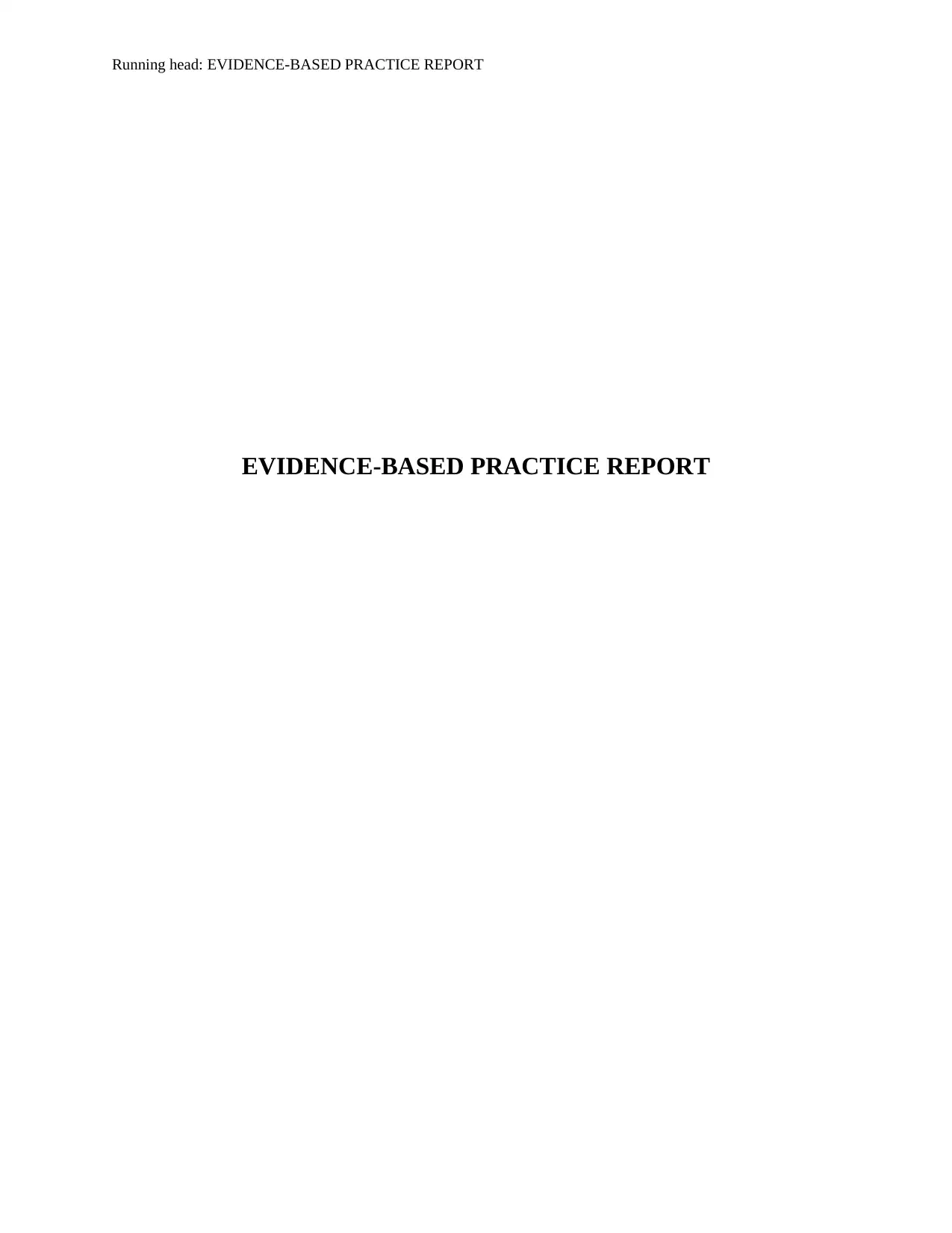
Running head: EVIDENCE-BASED PRACTICE REPORT
EVIDENCE-BASED PRACTICE REPORT
EVIDENCE-BASED PRACTICE REPORT
Paraphrase This Document
Need a fresh take? Get an instant paraphrase of this document with our AI Paraphraser
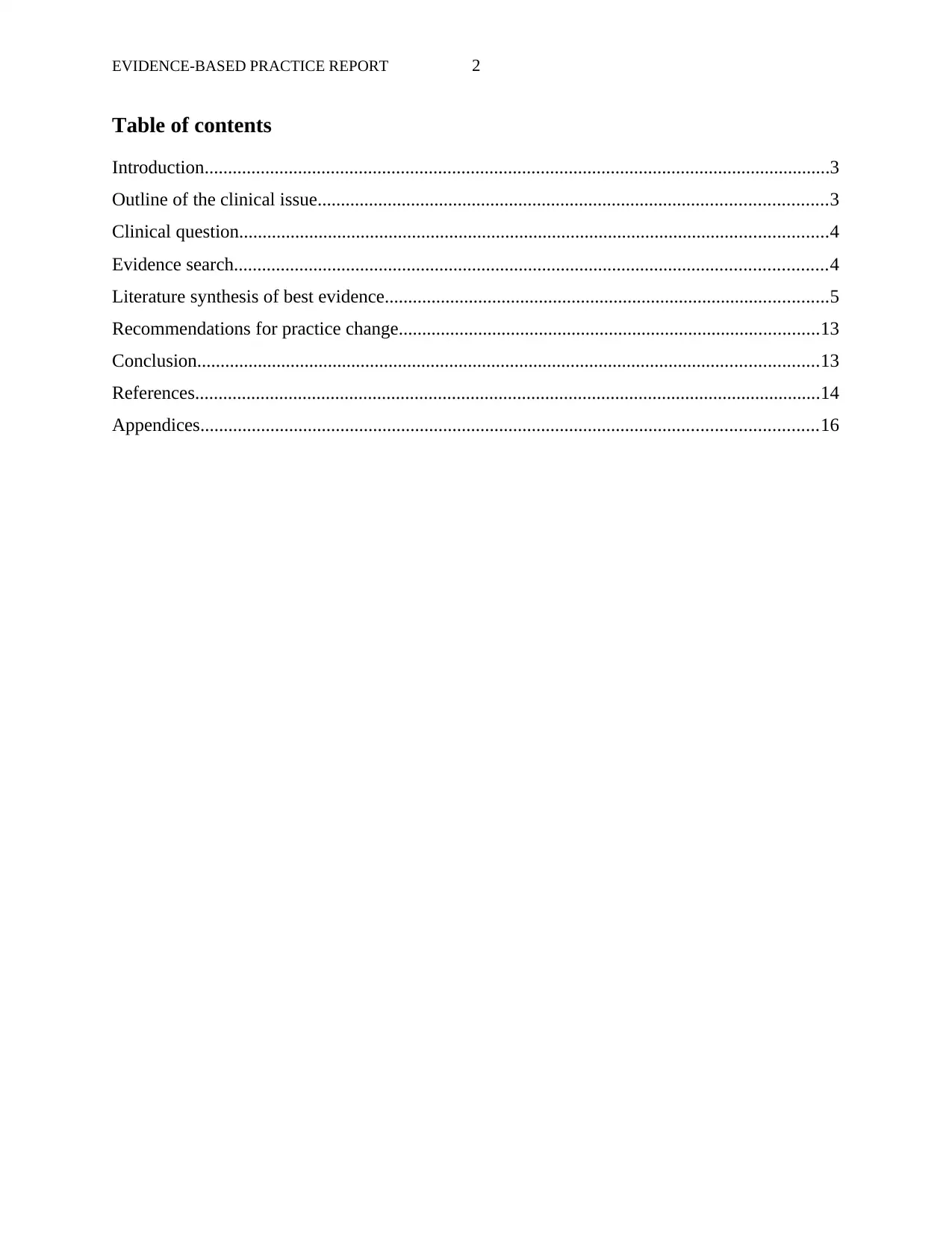
EVIDENCE-BASED PRACTICE REPORT 2
Table of contents
Introduction......................................................................................................................................3
Outline of the clinical issue.............................................................................................................3
Clinical question..............................................................................................................................4
Evidence search...............................................................................................................................4
Literature synthesis of best evidence...............................................................................................5
Recommendations for practice change..........................................................................................13
Conclusion.....................................................................................................................................13
References......................................................................................................................................14
Appendices....................................................................................................................................16
Table of contents
Introduction......................................................................................................................................3
Outline of the clinical issue.............................................................................................................3
Clinical question..............................................................................................................................4
Evidence search...............................................................................................................................4
Literature synthesis of best evidence...............................................................................................5
Recommendations for practice change..........................................................................................13
Conclusion.....................................................................................................................................13
References......................................................................................................................................14
Appendices....................................................................................................................................16
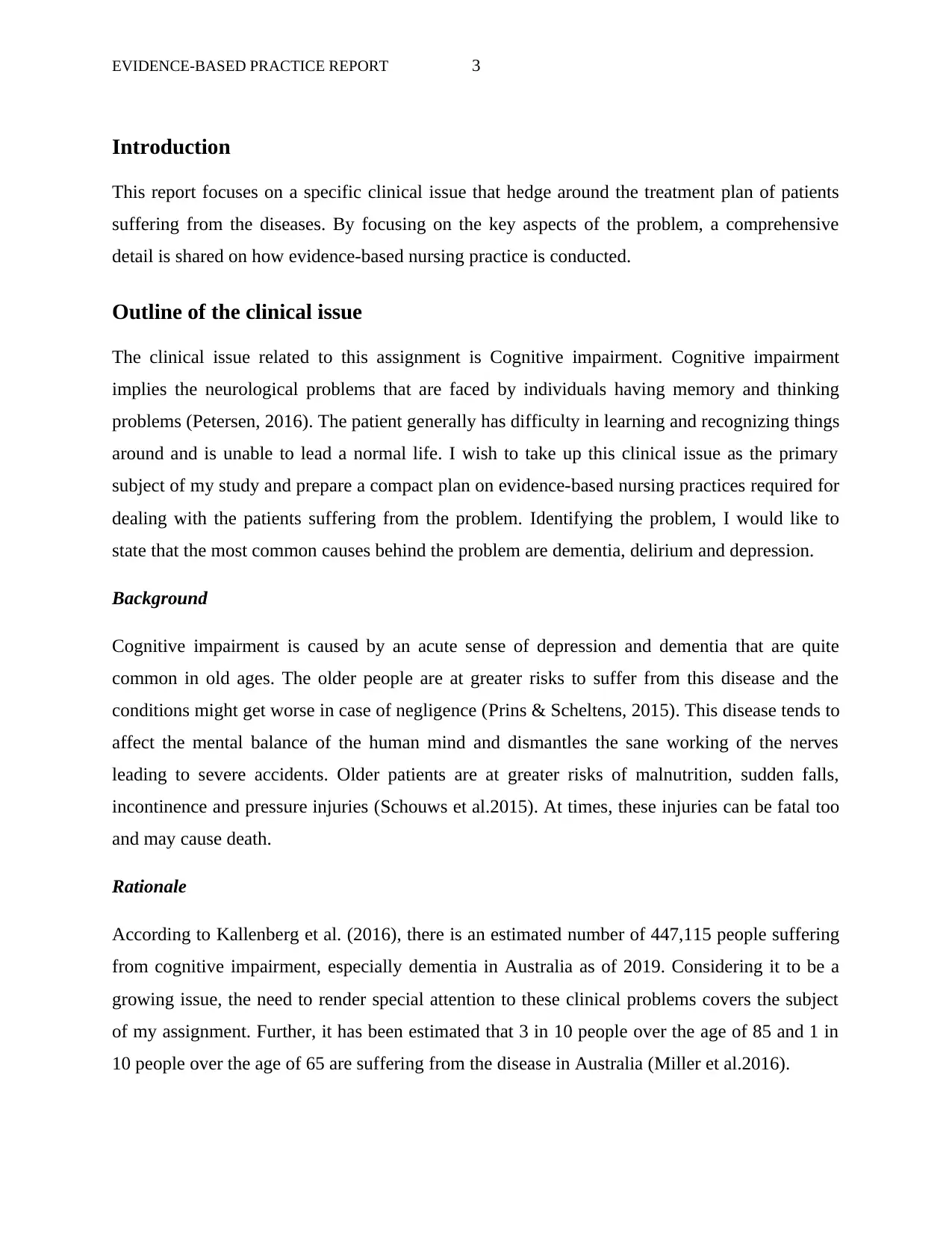
EVIDENCE-BASED PRACTICE REPORT 3
Introduction
This report focuses on a specific clinical issue that hedge around the treatment plan of patients
suffering from the diseases. By focusing on the key aspects of the problem, a comprehensive
detail is shared on how evidence-based nursing practice is conducted.
Outline of the clinical issue
The clinical issue related to this assignment is Cognitive impairment. Cognitive impairment
implies the neurological problems that are faced by individuals having memory and thinking
problems (Petersen, 2016). The patient generally has difficulty in learning and recognizing things
around and is unable to lead a normal life. I wish to take up this clinical issue as the primary
subject of my study and prepare a compact plan on evidence-based nursing practices required for
dealing with the patients suffering from the problem. Identifying the problem, I would like to
state that the most common causes behind the problem are dementia, delirium and depression.
Background
Cognitive impairment is caused by an acute sense of depression and dementia that are quite
common in old ages. The older people are at greater risks to suffer from this disease and the
conditions might get worse in case of negligence (Prins & Scheltens, 2015). This disease tends to
affect the mental balance of the human mind and dismantles the sane working of the nerves
leading to severe accidents. Older patients are at greater risks of malnutrition, sudden falls,
incontinence and pressure injuries (Schouws et al.2015). At times, these injuries can be fatal too
and may cause death.
Rationale
According to Kallenberg et al. (2016), there is an estimated number of 447,115 people suffering
from cognitive impairment, especially dementia in Australia as of 2019. Considering it to be a
growing issue, the need to render special attention to these clinical problems covers the subject
of my assignment. Further, it has been estimated that 3 in 10 people over the age of 85 and 1 in
10 people over the age of 65 are suffering from the disease in Australia (Miller et al.2016).
Introduction
This report focuses on a specific clinical issue that hedge around the treatment plan of patients
suffering from the diseases. By focusing on the key aspects of the problem, a comprehensive
detail is shared on how evidence-based nursing practice is conducted.
Outline of the clinical issue
The clinical issue related to this assignment is Cognitive impairment. Cognitive impairment
implies the neurological problems that are faced by individuals having memory and thinking
problems (Petersen, 2016). The patient generally has difficulty in learning and recognizing things
around and is unable to lead a normal life. I wish to take up this clinical issue as the primary
subject of my study and prepare a compact plan on evidence-based nursing practices required for
dealing with the patients suffering from the problem. Identifying the problem, I would like to
state that the most common causes behind the problem are dementia, delirium and depression.
Background
Cognitive impairment is caused by an acute sense of depression and dementia that are quite
common in old ages. The older people are at greater risks to suffer from this disease and the
conditions might get worse in case of negligence (Prins & Scheltens, 2015). This disease tends to
affect the mental balance of the human mind and dismantles the sane working of the nerves
leading to severe accidents. Older patients are at greater risks of malnutrition, sudden falls,
incontinence and pressure injuries (Schouws et al.2015). At times, these injuries can be fatal too
and may cause death.
Rationale
According to Kallenberg et al. (2016), there is an estimated number of 447,115 people suffering
from cognitive impairment, especially dementia in Australia as of 2019. Considering it to be a
growing issue, the need to render special attention to these clinical problems covers the subject
of my assignment. Further, it has been estimated that 3 in 10 people over the age of 85 and 1 in
10 people over the age of 65 are suffering from the disease in Australia (Miller et al.2016).
⊘ This is a preview!⊘
Do you want full access?
Subscribe today to unlock all pages.

Trusted by 1+ million students worldwide
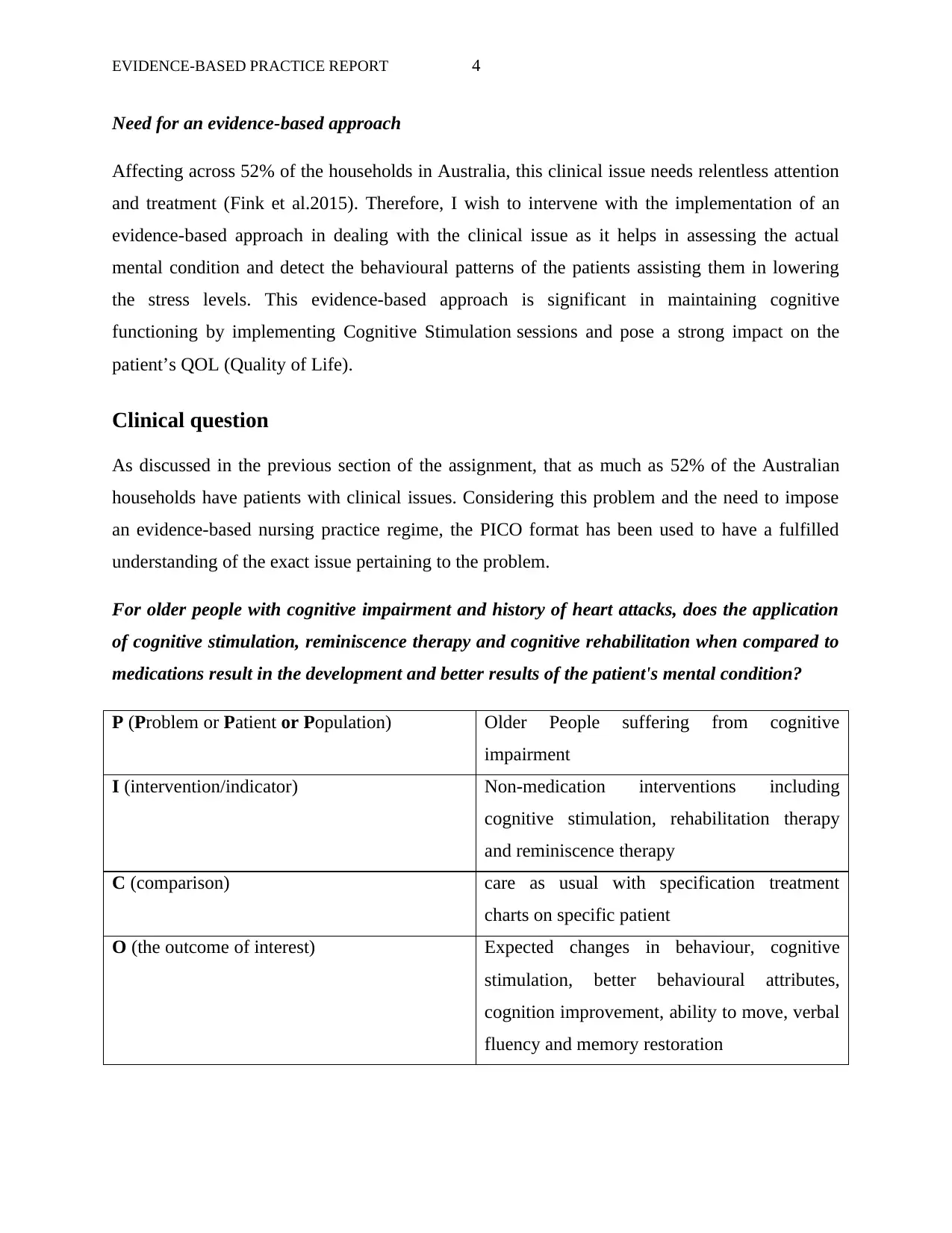
EVIDENCE-BASED PRACTICE REPORT 4
Need for an evidence-based approach
Affecting across 52% of the households in Australia, this clinical issue needs relentless attention
and treatment (Fink et al.2015). Therefore, I wish to intervene with the implementation of an
evidence-based approach in dealing with the clinical issue as it helps in assessing the actual
mental condition and detect the behavioural patterns of the patients assisting them in lowering
the stress levels. This evidence-based approach is significant in maintaining cognitive
functioning by implementing Cognitive Stimulation sessions and pose a strong impact on the
patient’s QOL (Quality of Life).
Clinical question
As discussed in the previous section of the assignment, that as much as 52% of the Australian
households have patients with clinical issues. Considering this problem and the need to impose
an evidence-based nursing practice regime, the PICO format has been used to have a fulfilled
understanding of the exact issue pertaining to the problem.
For older people with cognitive impairment and history of heart attacks, does the application
of cognitive stimulation, reminiscence therapy and cognitive rehabilitation when compared to
medications result in the development and better results of the patient's mental condition?
P (Problem or Patient or Population) Older People suffering from cognitive
impairment
I (intervention/indicator) Non-medication interventions including
cognitive stimulation, rehabilitation therapy
and reminiscence therapy
C (comparison) care as usual with specification treatment
charts on specific patient
O (the outcome of interest) Expected changes in behaviour, cognitive
stimulation, better behavioural attributes,
cognition improvement, ability to move, verbal
fluency and memory restoration
Need for an evidence-based approach
Affecting across 52% of the households in Australia, this clinical issue needs relentless attention
and treatment (Fink et al.2015). Therefore, I wish to intervene with the implementation of an
evidence-based approach in dealing with the clinical issue as it helps in assessing the actual
mental condition and detect the behavioural patterns of the patients assisting them in lowering
the stress levels. This evidence-based approach is significant in maintaining cognitive
functioning by implementing Cognitive Stimulation sessions and pose a strong impact on the
patient’s QOL (Quality of Life).
Clinical question
As discussed in the previous section of the assignment, that as much as 52% of the Australian
households have patients with clinical issues. Considering this problem and the need to impose
an evidence-based nursing practice regime, the PICO format has been used to have a fulfilled
understanding of the exact issue pertaining to the problem.
For older people with cognitive impairment and history of heart attacks, does the application
of cognitive stimulation, reminiscence therapy and cognitive rehabilitation when compared to
medications result in the development and better results of the patient's mental condition?
P (Problem or Patient or Population) Older People suffering from cognitive
impairment
I (intervention/indicator) Non-medication interventions including
cognitive stimulation, rehabilitation therapy
and reminiscence therapy
C (comparison) care as usual with specification treatment
charts on specific patient
O (the outcome of interest) Expected changes in behaviour, cognitive
stimulation, better behavioural attributes,
cognition improvement, ability to move, verbal
fluency and memory restoration
Paraphrase This Document
Need a fresh take? Get an instant paraphrase of this document with our AI Paraphraser
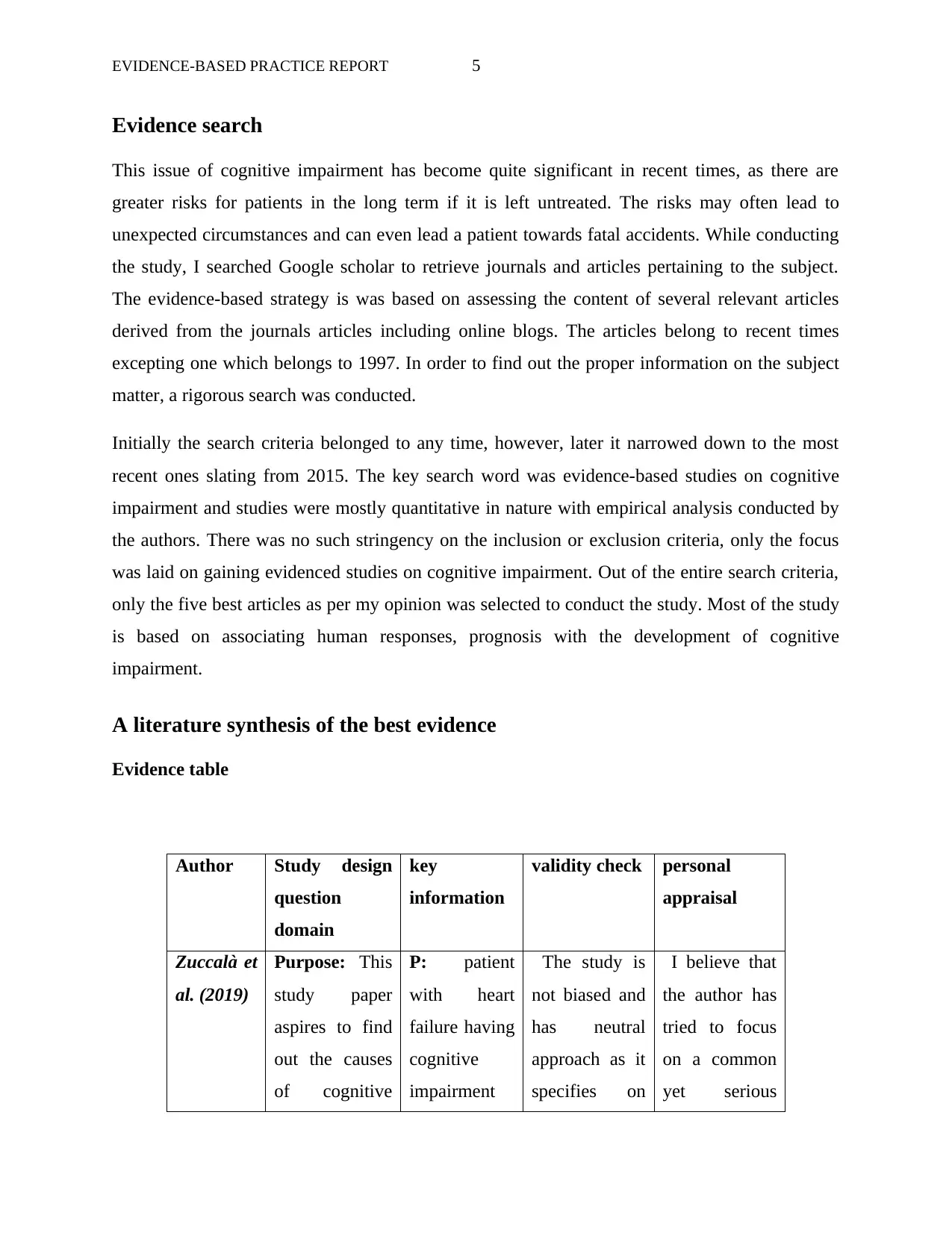
EVIDENCE-BASED PRACTICE REPORT 5
Evidence search
This issue of cognitive impairment has become quite significant in recent times, as there are
greater risks for patients in the long term if it is left untreated. The risks may often lead to
unexpected circumstances and can even lead a patient towards fatal accidents. While conducting
the study, I searched Google scholar to retrieve journals and articles pertaining to the subject.
The evidence-based strategy is was based on assessing the content of several relevant articles
derived from the journals articles including online blogs. The articles belong to recent times
excepting one which belongs to 1997. In order to find out the proper information on the subject
matter, a rigorous search was conducted.
Initially the search criteria belonged to any time, however, later it narrowed down to the most
recent ones slating from 2015. The key search word was evidence-based studies on cognitive
impairment and studies were mostly quantitative in nature with empirical analysis conducted by
the authors. There was no such stringency on the inclusion or exclusion criteria, only the focus
was laid on gaining evidenced studies on cognitive impairment. Out of the entire search criteria,
only the five best articles as per my opinion was selected to conduct the study. Most of the study
is based on associating human responses, prognosis with the development of cognitive
impairment.
A literature synthesis of the best evidence
Evidence table
Author Study design
question
domain
key
information
validity check personal
appraisal
Zuccalà et
al. (2019)
Purpose: This
study paper
aspires to find
out the causes
of cognitive
P: patient
with heart
failure having
cognitive
impairment
The study is
not biased and
has neutral
approach as it
specifies on
I believe that
the author has
tried to focus
on a common
yet serious
Evidence search
This issue of cognitive impairment has become quite significant in recent times, as there are
greater risks for patients in the long term if it is left untreated. The risks may often lead to
unexpected circumstances and can even lead a patient towards fatal accidents. While conducting
the study, I searched Google scholar to retrieve journals and articles pertaining to the subject.
The evidence-based strategy is was based on assessing the content of several relevant articles
derived from the journals articles including online blogs. The articles belong to recent times
excepting one which belongs to 1997. In order to find out the proper information on the subject
matter, a rigorous search was conducted.
Initially the search criteria belonged to any time, however, later it narrowed down to the most
recent ones slating from 2015. The key search word was evidence-based studies on cognitive
impairment and studies were mostly quantitative in nature with empirical analysis conducted by
the authors. There was no such stringency on the inclusion or exclusion criteria, only the focus
was laid on gaining evidenced studies on cognitive impairment. Out of the entire search criteria,
only the five best articles as per my opinion was selected to conduct the study. Most of the study
is based on associating human responses, prognosis with the development of cognitive
impairment.
A literature synthesis of the best evidence
Evidence table
Author Study design
question
domain
key
information
validity check personal
appraisal
Zuccalà et
al. (2019)
Purpose: This
study paper
aspires to find
out the causes
of cognitive
P: patient
with heart
failure having
cognitive
impairment
The study is
not biased and
has neutral
approach as it
specifies on
I believe that
the author has
tried to focus
on a common
yet serious
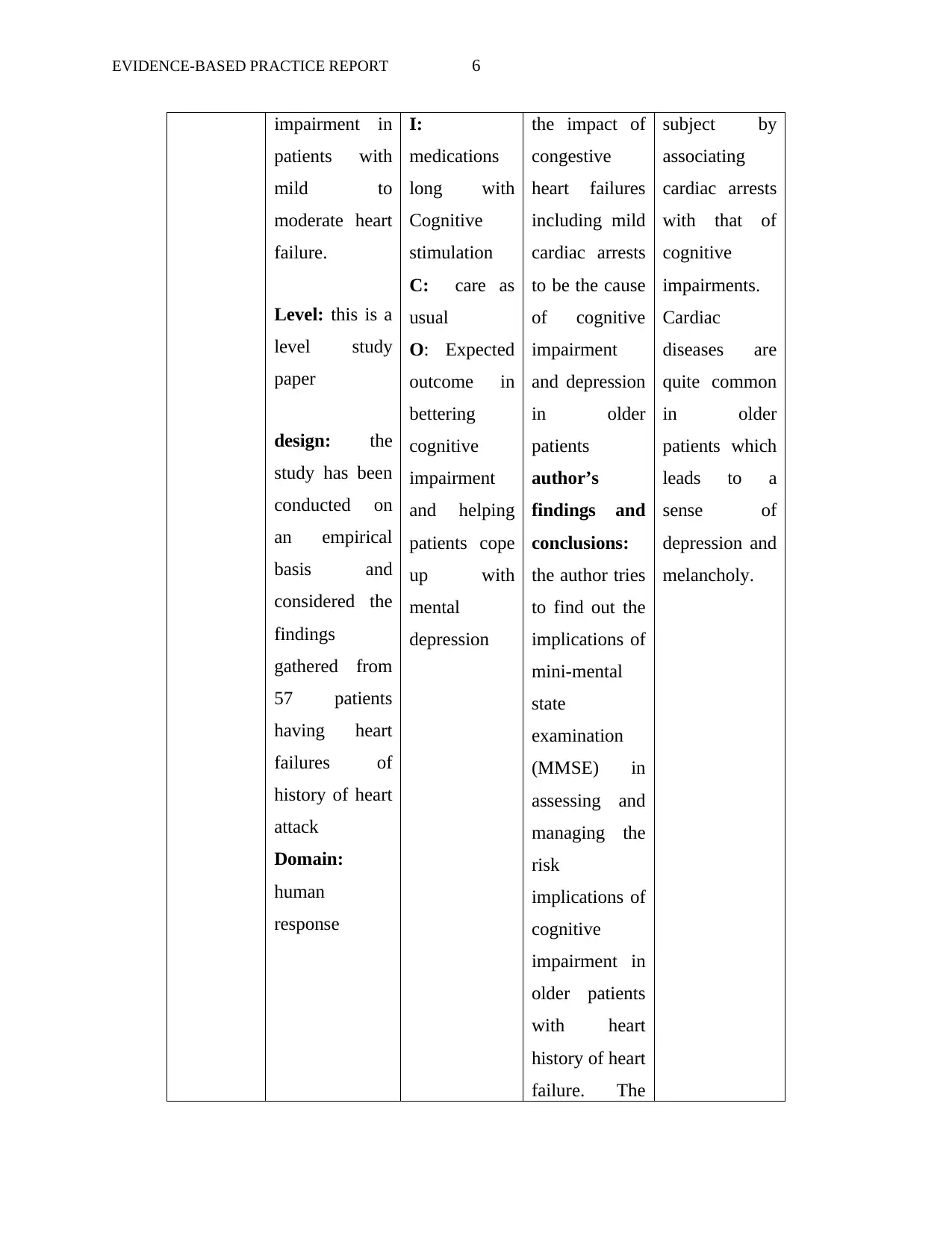
EVIDENCE-BASED PRACTICE REPORT 6
impairment in
patients with
mild to
moderate heart
failure.
Level: this is a
level study
paper
design: the
study has been
conducted on
an empirical
basis and
considered the
findings
gathered from
57 patients
having heart
failures of
history of heart
attack
Domain:
human
response
I:
medications
long with
Cognitive
stimulation
C: care as
usual
O: Expected
outcome in
bettering
cognitive
impairment
and helping
patients cope
up with
mental
depression
the impact of
congestive
heart failures
including mild
cardiac arrests
to be the cause
of cognitive
impairment
and depression
in older
patients
author’s
findings and
conclusions:
the author tries
to find out the
implications of
mini-mental
state
examination
(MMSE) in
assessing and
managing the
risk
implications of
cognitive
impairment in
older patients
with heart
history of heart
failure. The
subject by
associating
cardiac arrests
with that of
cognitive
impairments.
Cardiac
diseases are
quite common
in older
patients which
leads to a
sense of
depression and
melancholy.
impairment in
patients with
mild to
moderate heart
failure.
Level: this is a
level study
paper
design: the
study has been
conducted on
an empirical
basis and
considered the
findings
gathered from
57 patients
having heart
failures of
history of heart
attack
Domain:
human
response
I:
medications
long with
Cognitive
stimulation
C: care as
usual
O: Expected
outcome in
bettering
cognitive
impairment
and helping
patients cope
up with
mental
depression
the impact of
congestive
heart failures
including mild
cardiac arrests
to be the cause
of cognitive
impairment
and depression
in older
patients
author’s
findings and
conclusions:
the author tries
to find out the
implications of
mini-mental
state
examination
(MMSE) in
assessing and
managing the
risk
implications of
cognitive
impairment in
older patients
with heart
history of heart
failure. The
subject by
associating
cardiac arrests
with that of
cognitive
impairments.
Cardiac
diseases are
quite common
in older
patients which
leads to a
sense of
depression and
melancholy.
⊘ This is a preview!⊘
Do you want full access?
Subscribe today to unlock all pages.

Trusted by 1+ million students worldwide
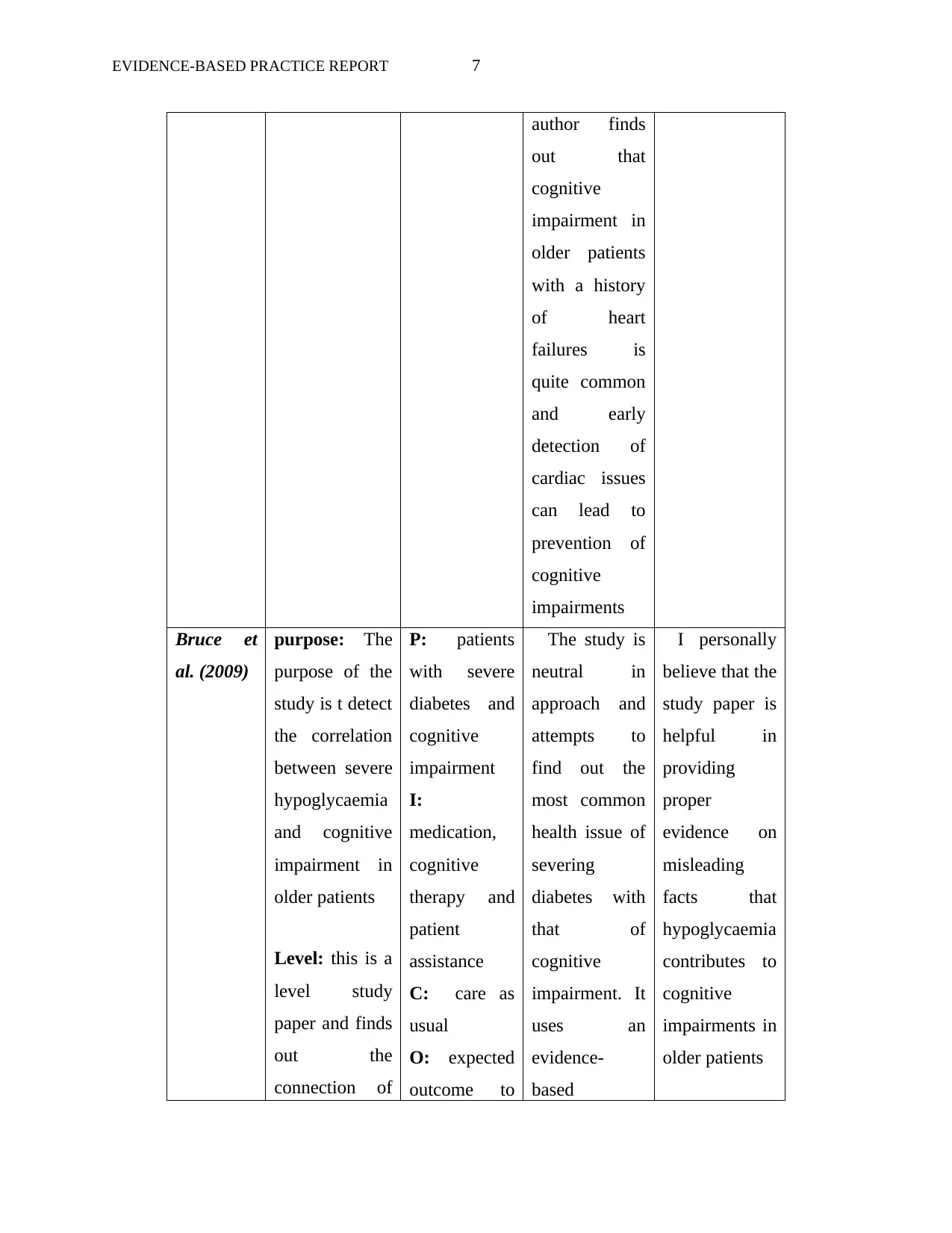
EVIDENCE-BASED PRACTICE REPORT 7
author finds
out that
cognitive
impairment in
older patients
with a history
of heart
failures is
quite common
and early
detection of
cardiac issues
can lead to
prevention of
cognitive
impairments
Bruce et
al. (2009)
purpose: The
purpose of the
study is t detect
the correlation
between severe
hypoglycaemia
and cognitive
impairment in
older patients
Level: this is a
level study
paper and finds
out the
connection of
P: patients
with severe
diabetes and
cognitive
impairment
I:
medication,
cognitive
therapy and
patient
assistance
C: care as
usual
O: expected
outcome to
The study is
neutral in
approach and
attempts to
find out the
most common
health issue of
severing
diabetes with
that of
cognitive
impairment. It
uses an
evidence-
based
I personally
believe that the
study paper is
helpful in
providing
proper
evidence on
misleading
facts that
hypoglycaemia
contributes to
cognitive
impairments in
older patients
author finds
out that
cognitive
impairment in
older patients
with a history
of heart
failures is
quite common
and early
detection of
cardiac issues
can lead to
prevention of
cognitive
impairments
Bruce et
al. (2009)
purpose: The
purpose of the
study is t detect
the correlation
between severe
hypoglycaemia
and cognitive
impairment in
older patients
Level: this is a
level study
paper and finds
out the
connection of
P: patients
with severe
diabetes and
cognitive
impairment
I:
medication,
cognitive
therapy and
patient
assistance
C: care as
usual
O: expected
outcome to
The study is
neutral in
approach and
attempts to
find out the
most common
health issue of
severing
diabetes with
that of
cognitive
impairment. It
uses an
evidence-
based
I personally
believe that the
study paper is
helpful in
providing
proper
evidence on
misleading
facts that
hypoglycaemia
contributes to
cognitive
impairments in
older patients
Paraphrase This Document
Need a fresh take? Get an instant paraphrase of this document with our AI Paraphraser
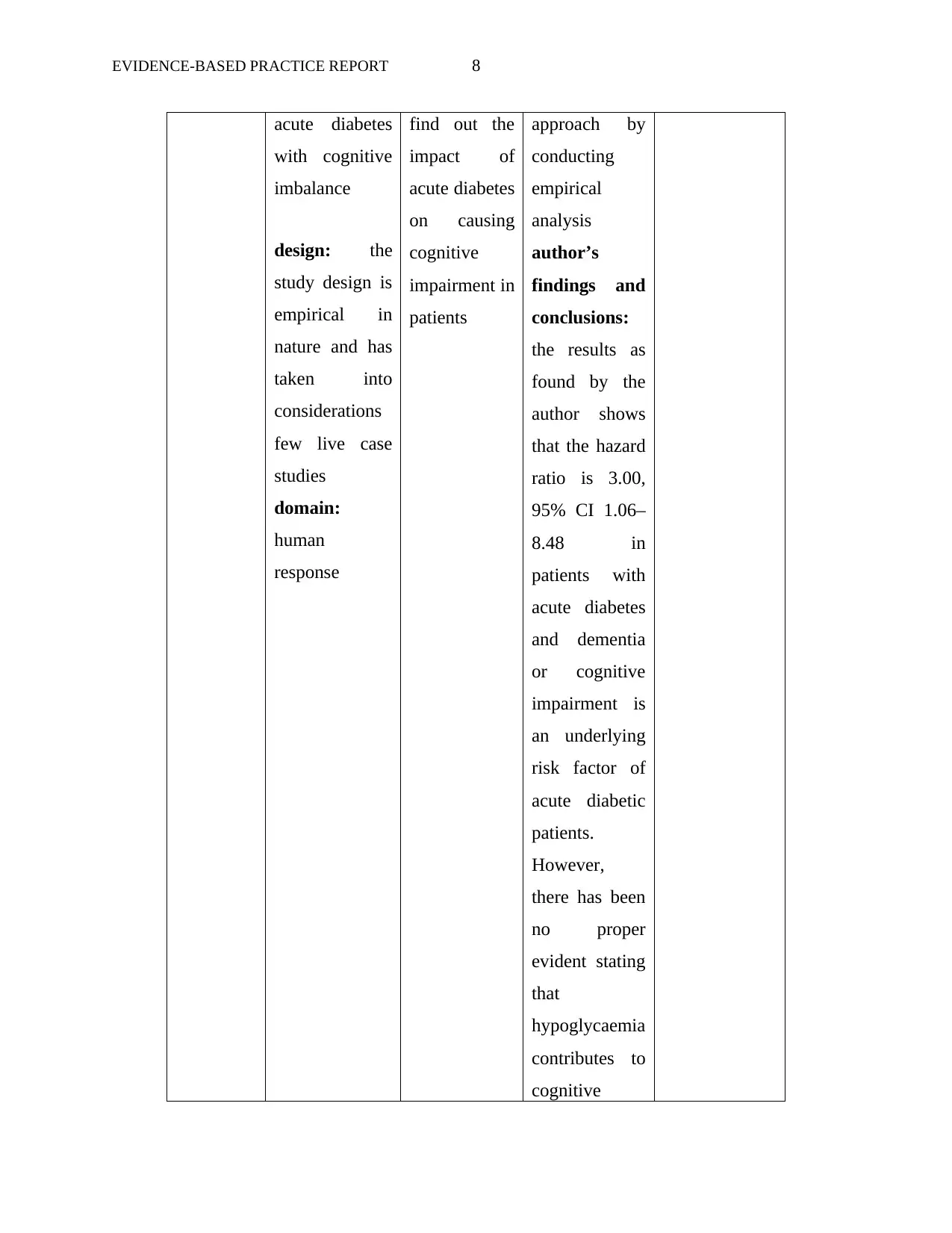
EVIDENCE-BASED PRACTICE REPORT 8
acute diabetes
with cognitive
imbalance
design: the
study design is
empirical in
nature and has
taken into
considerations
few live case
studies
domain:
human
response
find out the
impact of
acute diabetes
on causing
cognitive
impairment in
patients
approach by
conducting
empirical
analysis
author’s
findings and
conclusions:
the results as
found by the
author shows
that the hazard
ratio is 3.00,
95% CI 1.06–
8.48 in
patients with
acute diabetes
and dementia
or cognitive
impairment is
an underlying
risk factor of
acute diabetic
patients.
However,
there has been
no proper
evident stating
that
hypoglycaemia
contributes to
cognitive
acute diabetes
with cognitive
imbalance
design: the
study design is
empirical in
nature and has
taken into
considerations
few live case
studies
domain:
human
response
find out the
impact of
acute diabetes
on causing
cognitive
impairment in
patients
approach by
conducting
empirical
analysis
author’s
findings and
conclusions:
the results as
found by the
author shows
that the hazard
ratio is 3.00,
95% CI 1.06–
8.48 in
patients with
acute diabetes
and dementia
or cognitive
impairment is
an underlying
risk factor of
acute diabetic
patients.
However,
there has been
no proper
evident stating
that
hypoglycaemia
contributes to
cognitive
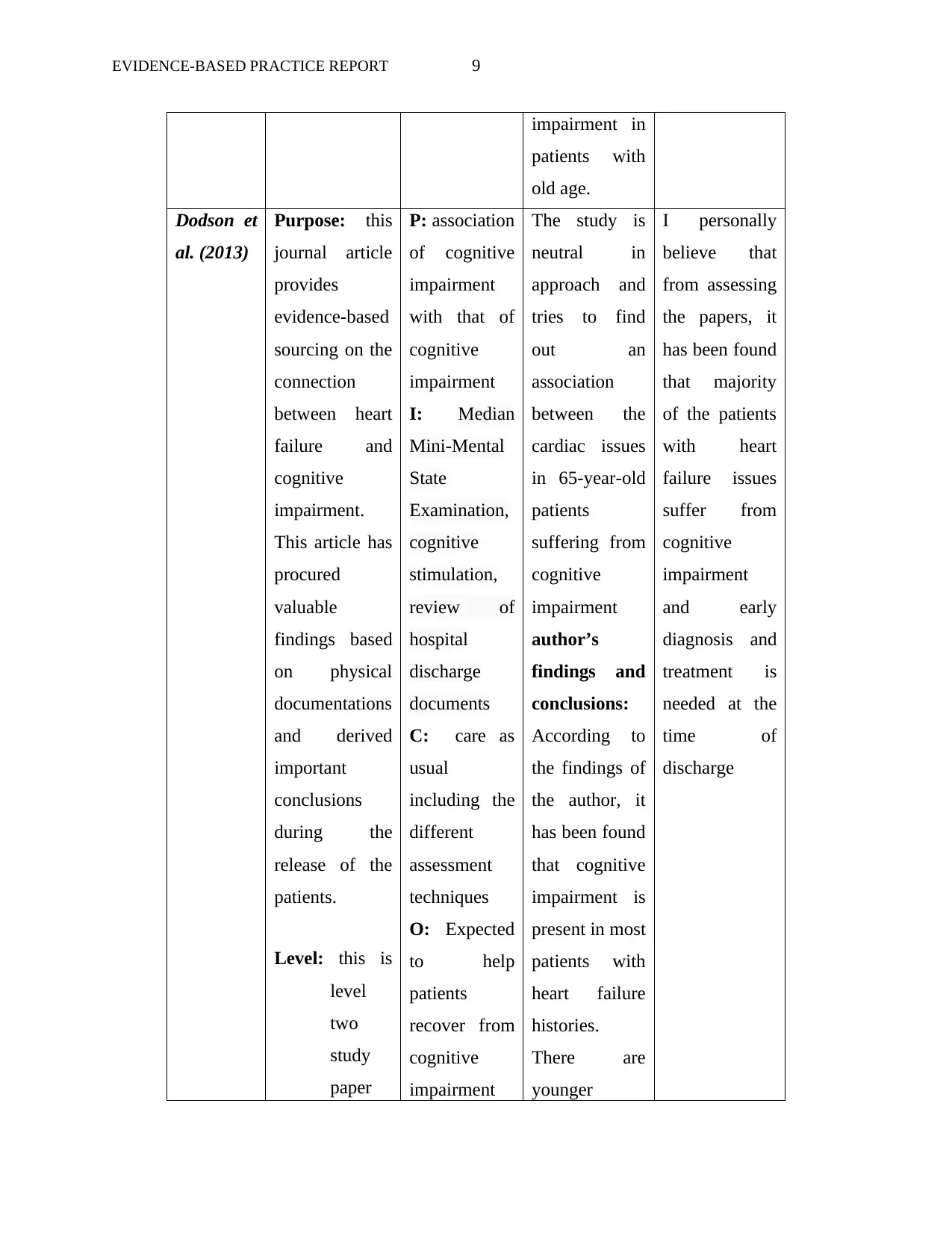
EVIDENCE-BASED PRACTICE REPORT 9
impairment in
patients with
old age.
Dodson et
al. (2013)
Purpose: this
journal article
provides
evidence-based
sourcing on the
connection
between heart
failure and
cognitive
impairment.
This article has
procured
valuable
findings based
on physical
documentations
and derived
important
conclusions
during the
release of the
patients.
Level: this is
level
two
study
paper
P: association
of cognitive
impairment
with that of
cognitive
impairment
I: Median
Mini-Mental
State
Examination,
cognitive
stimulation,
review of
hospital
discharge
documents
C: care as
usual
including the
different
assessment
techniques
O: Expected
to help
patients
recover from
cognitive
impairment
The study is
neutral in
approach and
tries to find
out an
association
between the
cardiac issues
in 65-year-old
patients
suffering from
cognitive
impairment
author’s
findings and
conclusions:
According to
the findings of
the author, it
has been found
that cognitive
impairment is
present in most
patients with
heart failure
histories.
There are
younger
I personally
believe that
from assessing
the papers, it
has been found
that majority
of the patients
with heart
failure issues
suffer from
cognitive
impairment
and early
diagnosis and
treatment is
needed at the
time of
discharge
impairment in
patients with
old age.
Dodson et
al. (2013)
Purpose: this
journal article
provides
evidence-based
sourcing on the
connection
between heart
failure and
cognitive
impairment.
This article has
procured
valuable
findings based
on physical
documentations
and derived
important
conclusions
during the
release of the
patients.
Level: this is
level
two
study
paper
P: association
of cognitive
impairment
with that of
cognitive
impairment
I: Median
Mini-Mental
State
Examination,
cognitive
stimulation,
review of
hospital
discharge
documents
C: care as
usual
including the
different
assessment
techniques
O: Expected
to help
patients
recover from
cognitive
impairment
The study is
neutral in
approach and
tries to find
out an
association
between the
cardiac issues
in 65-year-old
patients
suffering from
cognitive
impairment
author’s
findings and
conclusions:
According to
the findings of
the author, it
has been found
that cognitive
impairment is
present in most
patients with
heart failure
histories.
There are
younger
I personally
believe that
from assessing
the papers, it
has been found
that majority
of the patients
with heart
failure issues
suffer from
cognitive
impairment
and early
diagnosis and
treatment is
needed at the
time of
discharge
⊘ This is a preview!⊘
Do you want full access?
Subscribe today to unlock all pages.

Trusted by 1+ million students worldwide
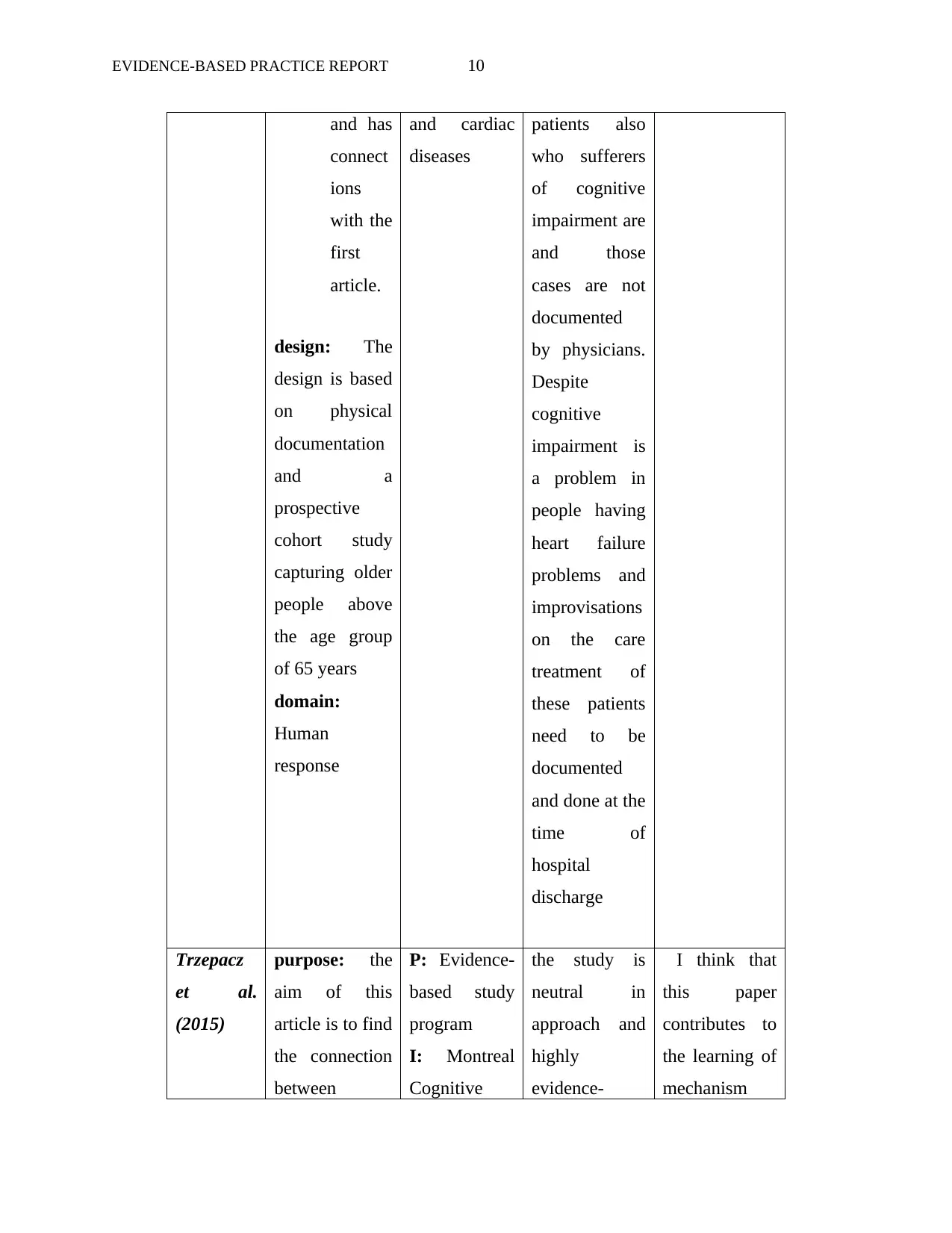
EVIDENCE-BASED PRACTICE REPORT 10
and has
connect
ions
with the
first
article.
design: The
design is based
on physical
documentation
and a
prospective
cohort study
capturing older
people above
the age group
of 65 years
domain:
Human
response
and cardiac
diseases
patients also
who sufferers
of cognitive
impairment are
and those
cases are not
documented
by physicians.
Despite
cognitive
impairment is
a problem in
people having
heart failure
problems and
improvisations
on the care
treatment of
these patients
need to be
documented
and done at the
time of
hospital
discharge
Trzepacz
et al.
(2015)
purpose: the
aim of this
article is to find
the connection
between
P: Evidence-
based study
program
I: Montreal
Cognitive
the study is
neutral in
approach and
highly
evidence-
I think that
this paper
contributes to
the learning of
mechanism
and has
connect
ions
with the
first
article.
design: The
design is based
on physical
documentation
and a
prospective
cohort study
capturing older
people above
the age group
of 65 years
domain:
Human
response
and cardiac
diseases
patients also
who sufferers
of cognitive
impairment are
and those
cases are not
documented
by physicians.
Despite
cognitive
impairment is
a problem in
people having
heart failure
problems and
improvisations
on the care
treatment of
these patients
need to be
documented
and done at the
time of
hospital
discharge
Trzepacz
et al.
(2015)
purpose: the
aim of this
article is to find
the connection
between
P: Evidence-
based study
program
I: Montreal
Cognitive
the study is
neutral in
approach and
highly
evidence-
I think that
this paper
contributes to
the learning of
mechanism
Paraphrase This Document
Need a fresh take? Get an instant paraphrase of this document with our AI Paraphraser
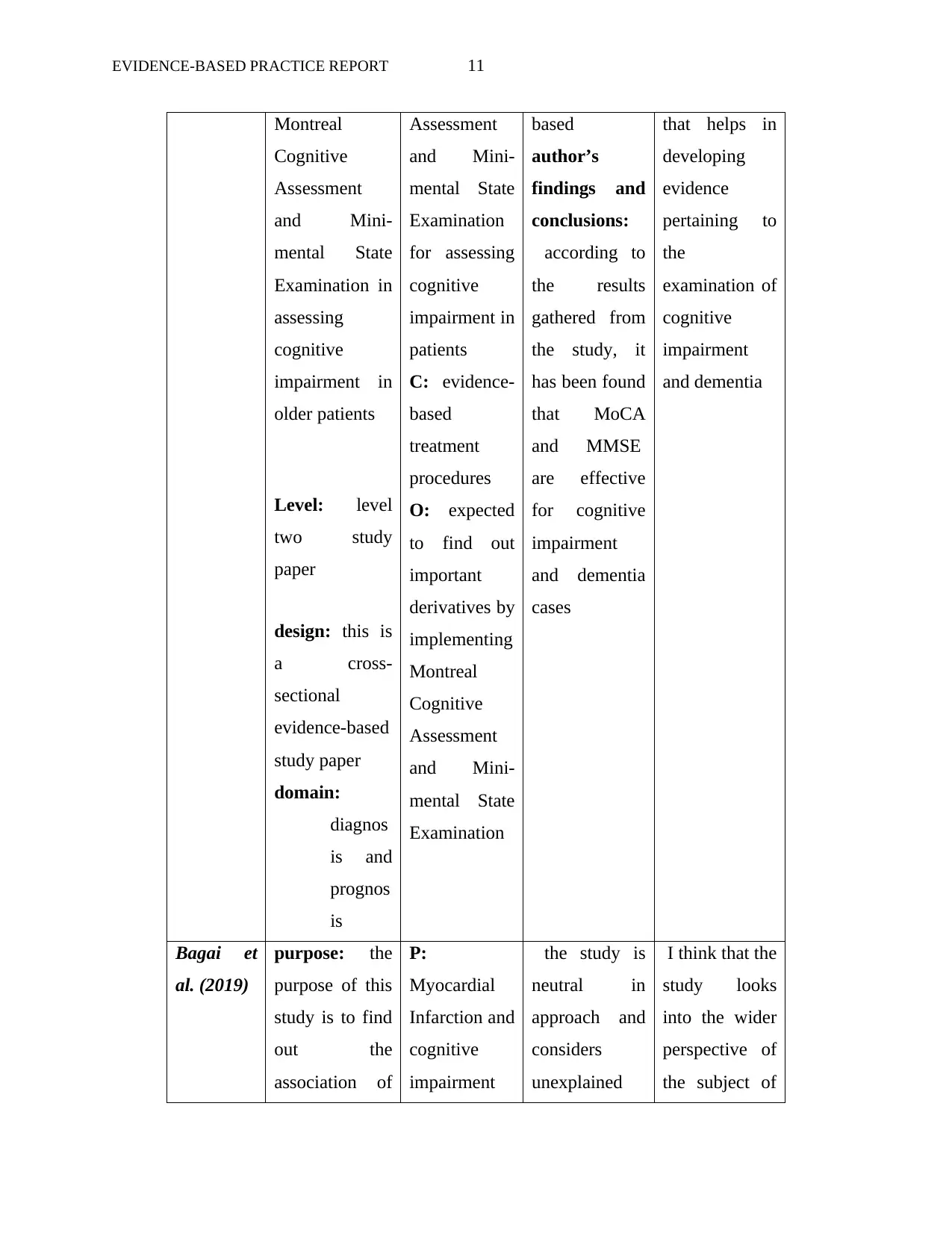
EVIDENCE-BASED PRACTICE REPORT 11
Montreal
Cognitive
Assessment
and Mini-
mental State
Examination in
assessing
cognitive
impairment in
older patients
Level: level
two study
paper
design: this is
a cross-
sectional
evidence-based
study paper
domain:
diagnos
is and
prognos
is
Assessment
and Mini-
mental State
Examination
for assessing
cognitive
impairment in
patients
C: evidence-
based
treatment
procedures
O: expected
to find out
important
derivatives by
implementing
Montreal
Cognitive
Assessment
and Mini-
mental State
Examination
based
author’s
findings and
conclusions:
according to
the results
gathered from
the study, it
has been found
that MoCA
and MMSE
are effective
for cognitive
impairment
and dementia
cases
that helps in
developing
evidence
pertaining to
the
examination of
cognitive
impairment
and dementia
Bagai et
al. (2019)
purpose: the
purpose of this
study is to find
out the
association of
P:
Myocardial
Infarction and
cognitive
impairment
the study is
neutral in
approach and
considers
unexplained
I think that the
study looks
into the wider
perspective of
the subject of
Montreal
Cognitive
Assessment
and Mini-
mental State
Examination in
assessing
cognitive
impairment in
older patients
Level: level
two study
paper
design: this is
a cross-
sectional
evidence-based
study paper
domain:
diagnos
is and
prognos
is
Assessment
and Mini-
mental State
Examination
for assessing
cognitive
impairment in
patients
C: evidence-
based
treatment
procedures
O: expected
to find out
important
derivatives by
implementing
Montreal
Cognitive
Assessment
and Mini-
mental State
Examination
based
author’s
findings and
conclusions:
according to
the results
gathered from
the study, it
has been found
that MoCA
and MMSE
are effective
for cognitive
impairment
and dementia
cases
that helps in
developing
evidence
pertaining to
the
examination of
cognitive
impairment
and dementia
Bagai et
al. (2019)
purpose: the
purpose of this
study is to find
out the
association of
P:
Myocardial
Infarction and
cognitive
impairment
the study is
neutral in
approach and
considers
unexplained
I think that the
study looks
into the wider
perspective of
the subject of
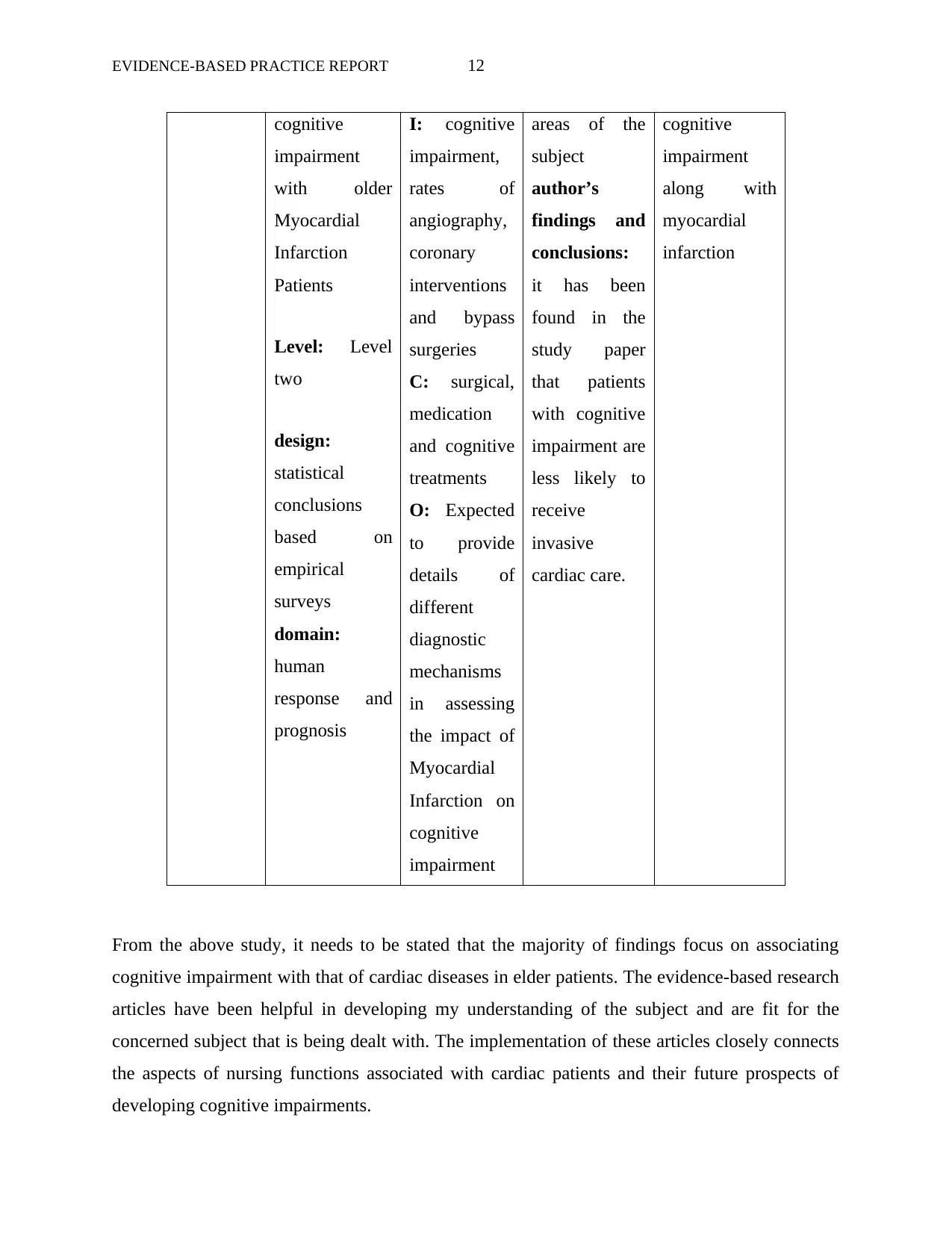
EVIDENCE-BASED PRACTICE REPORT 12
cognitive
impairment
with older
Myocardial
Infarction
Patients
Level: Level
two
design:
statistical
conclusions
based on
empirical
surveys
domain:
human
response and
prognosis
I: cognitive
impairment,
rates of
angiography,
coronary
interventions
and bypass
surgeries
C: surgical,
medication
and cognitive
treatments
O: Expected
to provide
details of
different
diagnostic
mechanisms
in assessing
the impact of
Myocardial
Infarction on
cognitive
impairment
areas of the
subject
author’s
findings and
conclusions:
it has been
found in the
study paper
that patients
with cognitive
impairment are
less likely to
receive
invasive
cardiac care.
cognitive
impairment
along with
myocardial
infarction
From the above study, it needs to be stated that the majority of findings focus on associating
cognitive impairment with that of cardiac diseases in elder patients. The evidence-based research
articles have been helpful in developing my understanding of the subject and are fit for the
concerned subject that is being dealt with. The implementation of these articles closely connects
the aspects of nursing functions associated with cardiac patients and their future prospects of
developing cognitive impairments.
cognitive
impairment
with older
Myocardial
Infarction
Patients
Level: Level
two
design:
statistical
conclusions
based on
empirical
surveys
domain:
human
response and
prognosis
I: cognitive
impairment,
rates of
angiography,
coronary
interventions
and bypass
surgeries
C: surgical,
medication
and cognitive
treatments
O: Expected
to provide
details of
different
diagnostic
mechanisms
in assessing
the impact of
Myocardial
Infarction on
cognitive
impairment
areas of the
subject
author’s
findings and
conclusions:
it has been
found in the
study paper
that patients
with cognitive
impairment are
less likely to
receive
invasive
cardiac care.
cognitive
impairment
along with
myocardial
infarction
From the above study, it needs to be stated that the majority of findings focus on associating
cognitive impairment with that of cardiac diseases in elder patients. The evidence-based research
articles have been helpful in developing my understanding of the subject and are fit for the
concerned subject that is being dealt with. The implementation of these articles closely connects
the aspects of nursing functions associated with cardiac patients and their future prospects of
developing cognitive impairments.
⊘ This is a preview!⊘
Do you want full access?
Subscribe today to unlock all pages.

Trusted by 1+ million students worldwide
1 out of 25
Related Documents
Your All-in-One AI-Powered Toolkit for Academic Success.
+13062052269
info@desklib.com
Available 24*7 on WhatsApp / Email
![[object Object]](/_next/static/media/star-bottom.7253800d.svg)
Unlock your academic potential
Copyright © 2020–2026 A2Z Services. All Rights Reserved. Developed and managed by ZUCOL.





